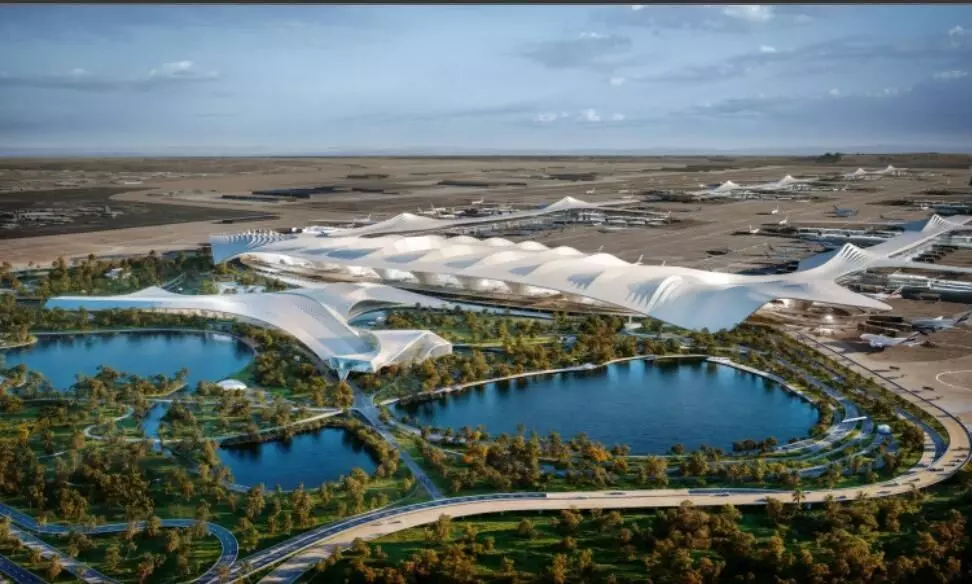
The evolving landscape of air cargo in the Middle East

Artist's impression of the phase two expansion project of Al Maktoum International Airport (DWC)
The Middle East's strategic location fuels its ascent in global air cargo. Booming e-commerce, infrastructure investments, and tech integration pave the way for regional dominance amidst geopolitical challenges
The Middle East region has emerged as a vital player in the global air cargo industry, strategically positioned at the crossroads of major trade routes between Asia, Europe, and Africa. With its geographic advantages, state-of-the-art infrastructure, and ambitious expansion plans, the region is poised to capture a significant share of the air cargo market.
Geographic advantages and network expansion
Leveraging the Middle East's central location and proximity to major markets, airlines and cargo carriers in the region are expanding their air cargo networks and enhancing connectivity. This geographical advantage has made the Middle East an attractive hub for air cargo operations. According to the International Air Transport Association (IATA), the region witnessed significant growth in 2023, with an 18.3% increase in demand for global and international operations compared to 2022, accompanied by a 17.7% increase in capacity.
"The UAE's proximity to significant global markets allows Etihad Cargo to reach about one-third of the world's population within a four-hour flight and two-thirds within an eight-hour flight, enabling us to transport cargo quickly and efficiently."
Stanislas Brun, Etihad Airways
To support this growth, significant investments are being made in infrastructure and technology across the region. Doha's Hamad Airport is investing $1.2 billion in cargo terminal expansion, while Etihad Cargo has doubled its cool chain capacity at its Abu Dhabi hub to accommodate an additional 50,000 tonnes. Saudi Arabia, fueled by Vision 2030's $100 billion investment, aims to be a major cargo player, tripling cargo volume to 4.5 million tonnes and expanding warehousing to 6 million tonnes with Riyadh and Jeddah becoming key global connecting hubs.
Dubai just unveiled the plan to build an airport of the future at a whopping investment of $35 billion. When completed, Al Maktoum International Airport (DWC) in Dubai South will emerge as the world’s largest airport, covering an expansive area of 70 square kilometres. The airport will have an ultimate capacity exceeding 260 million passengers and 12 million tonnes of cargo per annum. To be developed by the Dubai Aviation Engineering Projects (DAEP), a leading engineering organisation responsible for the design, master planning, infrastructure development and construction of Dubai’s dynamic aviation sector, the airport will be the largest in the world when fully operational both in terms of passenger and cargo traffic. “We are building a new project for future generations, ensuring continuous and stable development for our children and their children in turn. Dubai will be the world's airport, its port, its urban hub, and its new global centre,” said Sheikh Mohammed bin Rashid Al Maktoum, Vice President and Prime Minister of the UAE and Ruler of Dubai, who reviewed and approved the strategic plan and design of DAEP.
E-commerce boom
Complementing the geographic advantages and infrastructure developments, the booming e-commerce market in the Middle East is driving further demand for air cargo services. Driven by increasing internet penetration, changing consumer preferences, and the rise of digital shopping platforms, the e-commerce market in the region is expected to reach $49 billion by 2025, growing at a CAGR of 19% between 2019 and 2025, according to Bain & Company.
"Recognising the potential of e-commerce, we have established partnerships through signing dedicated e-commerce contracts with key partners and customers. These agreements extend our dedicated charters for e-commerce goods until December 2024," added Brun. "Our SecureTech platform is tailored for the safe and secure transportation of lithium-powered goods, such as laptops and mobile phones. This initiative has already yielded significant results; in 2024, we observed a 51% increase in electronics shipments compared to the same period in the previous year."
Dnata is making significant strides to enhance its cargo operations and customer experience. To achieve this, they're launching a next-generation airport community system: Calogi. As Guillaume Crozier, SVP- UAE Cargo & Global Cargo Strategy, dnata, explains “The new generation of Calogi will help us to deliver on our cargo strategy to bring the customer more near real-time visibility. It will provide the customer with more service offerings within the world of cargo and logistics. From a traditional warehouse offering to more third-party logistics and covering fulfilment centres, which our customers request. This includes transportation on the ground, road feeder services, and first-mile, last-mile activity for e-commerce.”
Geopolitical risks and mitigation strategies
While the Middle East presents significant opportunities, the region has also witnessed its fair share of geopolitical instability and conflicts, which can pose risks to air cargo operations. The ongoing tensions between Iran and several Gulf nations, the protracted conflicts in the Red Sea, and the Israeli-Palestinian conflict have contributed to a complex and volatile security landscape and affected the global cargo industry, especially the Middle East.
"Air freight is a cyclical industry and, over the decades, we have seen peaks and troughs, driven by macroeconomic and geopolitical issues. It is important to look at the big picture and ensure short term blips in either direction do not impact the medium or long term. As an industry, we are resilient and flexible, enabling us to pivot quickly to find solutions for our customers, for example by adjusting routes and schedules as needed to ensure minimal disruption to our services."
Khalid Bardan, Emirates SkyCargo
Etihad Cargo demonstrates its mitigation strategies through its Cargo Control Centre. Brun describes it as "central to our approach." Equipped with automation and real-time monitoring, the centre allows for proactive responses to regional disruptions. "We closely monitor the global situation," says Brun, "so we can provide proactive solutions to ensure we maintain the highest standards of quality and reliability and navigate any challenges with agility and minimal disruptions."
Specialised cargo services and innovative solutions
To cater to the diverse needs of different cargo segments, airlines and cargo carriers in the Middle East are offering specialised services and innovative solutions. Building on a 25% increase in pharmaceutical shipments in 2022, Emirates SkyCargo will likely experience continued growth in this sector due to the rising demand for temperature-controlled environments and specialised handling procedures.
Abu Dhabi Airports is tailoring its developments and facilities to align with the specific requirements of industries such as pharmaceuticals, perishables, and e-commerce.
"We are tailoring our developments and current facilities to align with the specific requirements of industries such as pharmaceuticals, perishables, and e-commerce. This involves developing turnkey solutions and collaborating with other government entities to enhance Abu Dhabi's single-window digital platform, thereby improving supply chain efficiencies for our stakeholders."
Wilson Chan, Abu Dhabi Airports
Qatar Airways Cargo recently opened a brand new live animal transport facility at Hamad International Airport in Doha. Spanning 5,260 sq. m., it features dedicated areas for various creatures and advanced climate control systems. The centre accommodates 47 ULD positions and can handle over 55,000 animals annually, including 10,000 horses, setting a new standard for live animal air cargo.
Furthermore, carriers are exploring the integration of emerging technologies like blockchain, Internet of Things (IoT), and artificial intelligence (AI) to enhance supply chain visibility, optimise cargo handling, and improve overall operational efficiency. The global blockchain in transportation and logistics market is expected to grow from $369 million in 2020 to $1.7 billion by 2025, at a CAGR of 35.2%, according to Markets and Markets.
"Our focus on enhancing cool chain logistics enabled us to achieve a 37% increase in PharmaLife shipments and a 10% increase in FreshForward shipments in 2023. We inaugurated a new pharma hub, doubling our cool chain storage and handling capacity, enhancing our ability to manage temperature-sensitive shipments. Establishing Pharma Corridor 2.0 and Fresh Corridor 2.0 have increased our volumes and set new standards in transparency, traceability, and trackability within the sector," stated Brun.
Highlighting the efficient use of AI at dnata facilities, Crozier added, “The software of our partner, Gather AI, enables our drones to map the environment, collect inventory data, count cases, measure temperature, and read barcodes using only their cameras, without the need for any additional active infrastructure. With routine tasks automated with AI, human resources can be allocated to more complex responsibilities, ultimately improving overall workforce productivity.”
Sustainability and environmental initiatives
Amidst the growth and expansion, airlines and cargo carriers in the Middle East are also taking proactive steps towards sustainable operations to reduce their environmental footprint. The aviation industry aims to achieve net-zero carbon emissions by 2050, according to IATA.
Carriers in the region are investing in fuel-efficient aircraft, exploring alternative fuel sources, implementing waste management programmes, and adopting green logistics practices. For example, Emirates SkyCargo has committed to reducing its emissions intensity by 20% by 2030, compared to 2018 levels.
"In line with Abu Dhabi Environment Vision 2030 and IATA industry targets, our approach includes a mid-term strategy of renewing our fleet with aircraft that feature lighter structures and more fuel-efficient engines, which reduces our carbon footprint. In the short term, we have made considerable strides in reducing plastic waste by eliminating 41 single-use plastic items by 2020, preventing 17 tonnes of waste from reaching landfills. Following the introduction of our enhanced Economy experience, we've achieved an 80% reduction in single-use plastics, removing nearly 100 plastic items from our aircraft," added Brun.
The booming data centre market
Adding to the growth opportunities, the data centre boom in the Middle East is creating a surge in air cargo demand. The region's strategic location and government incentives are attracting major data centre investments, projected to reach USD 8.38 billion by 2028, according to a report by Arizton Advisory & Intelligence.
Recent comments by OpenAI CEO Sam Altman suggest that the Middle East is being considered as a potential location for a global network of AI chip fabrication plants. This development could further accelerate the data centre boom and magnify the demand for efficient air cargo services in the region.
Tech giants like Microsoft, Amazon, Oracle, and Equinix are setting up data centres in the UAE, Qatar, Bahrain, and Saudi Arabia. These multi-billion dollar projects require massive shipments of IT equipment, cooling systems, and other infrastructure components. Specialised air cargo services are emerging to meet this demand, ensuring secure and expedited transportation of critical hardware to minimise data centre downtime, highlighting the strong synergy between the growing data centre industry and the air cargo sector in the Middle East.
As airlines and cargo carriers in the Middle East continue to invest in technology, adapt to changing market dynamics, and foster industry collaborations, they are well-positioned to capitalise on the trends shaping the future of air cargo. By addressing the challenges of competition, geopolitical risks, and sustainability concerns, while offering specialised services and innovative solutions, the Middle East is poised to become a leading player in the global air cargo market, facilitating seamless trade and connecting businesses worldwide.
This was originally published in the May 2024 issue of The STAT Trade Times

